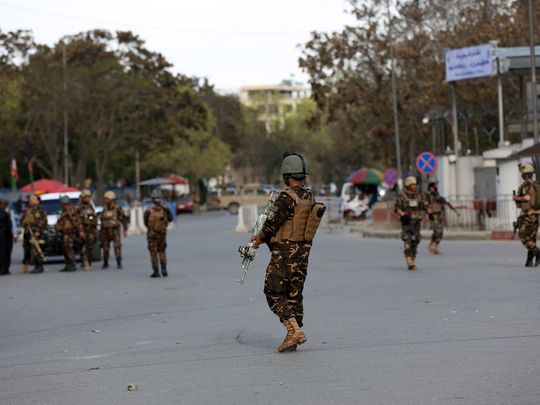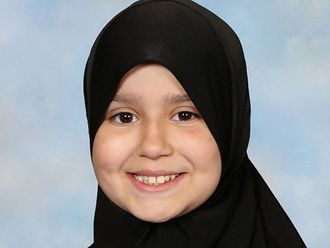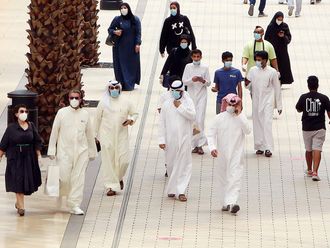
Kabul: The Taliban raced closer to a complete military takeover of Afghanistan on Sunday after capturing more major cities, leaving only the isolated capital Kabul for them to conquer.
The insurgents took control of the key eastern city of Jalalabad on Sunday, just hours after the seizing the northern anti-Taliban bastion of Mazar-i-Sharif - furthering an astonishing rout of government forces and warlord militias achieved in just 10 days.
"We woke up this morning to the Taliban white flags all over the city. They entered without fighting," said Jalalabad resident Ahmad Wali, confirming a claim on social media made by the Taliban.
President Ashraf Ghani's government appeared to be left with few options as the Taliban effectively surrounded Kabul - either prepare for a bloody fight for the capital or capitulate.
On Saturday Ghani sought to project a semblance of authority with a national address in which he spoke of "re-mobilising" the military while seeking a "political solution" to the crisis.
But the loss of Mazar-i-Sharif and Jalalabad are huge back-to-back blows for Ghani and his government.
It left the Taliban - who have fighters less than an hour's drive from Kabul - holding all the cards in any negotiated surrender of the capital.
President Joe Biden ordered the deployment of an additional 1,000 US troops to help secure the emergency evacuation from Kabul of embassy employees and thousands of Afghans who worked for American forces and now fear Taliban reprisals.
That was on top of the 3,000 American soldiers deployed in recent days, and 1,000 left in-country after Biden announced in May that the final withdrawal of the 20-year military presence in Afghanistan would be completed by September 11.
That decision has come under increased scrutiny given the collapse of the Afghan armed forces, but he insisted Saturday there was no choice.
"I was the fourth president to preside over an American troop presence in Afghanistan - two Republicans, two Democrats. I would not, and will not, pass this war onto a fifth," Biden said.
Heavy fighting
In Mazar-i-Sharif, Taliban fighters quickly took charge.
"They are parading on their vehicles and motorbikes, firing into the air in celebration," said Atiqullah Ghayor, who lives near the city's famed blue mosque.
Warlords Abdul Rashid Dostum and Atta Mohammad Noor, who had led a militia resistance in the city to support government forces, had fled to Uzbekistan, about 30 kilometres to the north, an aide to Noor said.
Noor later tweeted that they had been betrayed by the military and were in a "safe place", adding: "I have a lot of untold stories that I will share in due course."
As the Taliban closed in on the capital, panicked residents formed long lines outside banks, hoping to withdraw their savings. Some branches appeared to have already run out of cash.
Residents near Pul-e-Charkhi prison outside Kabul told AFP they heard gunfire coming from the facility - possibly the result of an inmate uprising.
In his first address to the nation since the Taliban launched their sweeping offensive, which was recorded, Ghani said he wanted to stop the violence.
"I will not let the imposed war on people cause more deaths," he said, appearing sombre and sitting before an Afghan flag.
Ghani said the armed forces could be "remobilized" and consultations were taking place to try to help end the fighting, but offered few specifics on what his administration was planning.
The presidential palace later said: "A delegation with authority should soon be appointed by the government and be ready for negotiation."
Further details were not immediately available.
'Crying night and day'
For Kabul residents and the tens of thousands who have sought refuge there in recent weeks, the overwhelming mood was one of apprehension and fear.
Muzhda, 35, a single woman who arrived in the capital with her two sisters after fleeing nearby Parwan, said she was terrified.
"I am crying day and night," she told AFP. "If the Taliban come and force me to marry, I will commit suicide."
The Taliban imposed an ultra-austere brand of Islam on Afghanistan during their 1996-2001 rule.
The scale and speed of their advance have shocked Afghans and the US-led alliance that poured billions into the country after toppling the insurgents in the wake of the September 11, 2001 attacks.
Individual Afghan soldiers, units and even whole divisions have surrendered - handing the Taliban even more vehicles and military hardware for their lightning advance.
Timeline: the Taliban's sweeping offensive in Afghanistan
Fierce fighting
In early May, NATO begins a final withdrawal of its mission in Afghanistan involving 9,600 soldiers - 2,500 of them American.
Intense fighting soon breaks out between the Taliban and government forces in southern Helmand province.
A bomb blast outside a girls' school on May 8 in Kabul kills 85, mostly pupils.
The deadliest attack in a year is blamed on the Taliban, though they do not claim it.
Taliban advance
US forces withdraw from one of Afghanistan's largest air bases in Kandahar, the country's second-biggest city, in mid-May.
The insurgents then seize districts in Wardak province near Kabul, and in the key province of Ghazni, which straddles roads connecting the capital to Kandahar.
By mid-June they have captured several districts in northern provinces, forcing military retreats.
The Taliban take control of the main Shir Khan Bandar border crossing with Tajikistan on June 22, prompting the Central Asian country to check the combat readiness of its armed forces.
US leaves Bagram
Officials on July 2 announce the departure of all American and NATO troops from Bagram, Afghanistan's biggest air base, which served as the linchpin of US-led operations in the country for two decades.
Two days later, the Taliban seize the key district of Panjwai in Kandahar, the insurgents' birthplace and former bastion.
The Taliban announce the capture of Islam Qala, Afghanistan's biggest border crossing with Iran, on July 9.
On July 14, the insurgents take control of the Spin Boldak border crossing with Pakistan, a major trade route between the two countries.
Urban onslaught
The Taliban offensive escalates sharply with a new focus on urban centres as the insurgents attack the cities of Lashkar Gah, Kandahar and Herat.
The United States and Britain say the Taliban may have committed war crimes, accusing the insurgents of "massacring civilians" in the town of Spin Boldak.
Eight people are killed on August 3 in a coordinated Taliban-claimed bomb and gun attack targeting the Afghan defence minister and several lawmakers in Kabul.
The Taliban shoot dead the head of the Afghan government's media information centre at a mosque in the capital on August 6.
Provincial capitals fall
The Taliban capture their first Afghan provincial capital, the city of Zaranj in southwestern Nimroz, taking it "without a fight".
The following days several other northern cities fall: Sheberghan, Kunduz, Sar-e-Pul, Taloqan, Aibak, Farah and Pul-e-Khumri.
Despite the bloodshed and sweeping advances, US President Joe Biden gives no suggestion he will delay the withdrawal deadline.
Afghan President Ashraf Ghani flies to the besieged northern city of Mazar-i-Sharif on August 11 to rally his forces.
But his visit is overshadowed by the surrender of hundreds of Afghan soldiers in nearby Kunduz and the overnight capture of a ninth provincial capital, Faizabad.
Within reach of Kabul
The Taliban capture Ghazni, 150 kilometres (90 miles) southwest of Kabul, on August 12.
Herat falls in the west the same day, and a day later the Taliban capture Kandahar and Lashkar Gah in the south.
The cities of Asadabad and Gardez follow on Saturday with Mazar-i-Sharif, which President Ghani had visited just three days earlier.
Jalalabad is taken over by the insurgents early on Sunday, leaving Kabul the only remaining major Afghan city still under government control.








